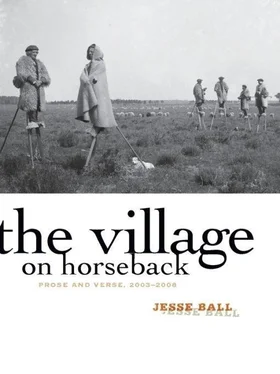Jesse Ball - The Village on Horseback - Prose and Verse, 2003-2008
Здесь есть возможность читать онлайн «Jesse Ball - The Village on Horseback - Prose and Verse, 2003-2008» весь текст электронной книги совершенно бесплатно (целиком полную версию без сокращений). В некоторых случаях можно слушать аудио, скачать через торрент в формате fb2 и присутствует краткое содержание. Год выпуска: 2011, Издательство: Milkweed Editions, Жанр: Современная проза, Поэзия, на английском языке. Описание произведения, (предисловие) а так же отзывы посетителей доступны на портале библиотеки ЛибКат.
- Название:The Village on Horseback: Prose and Verse, 2003-2008
- Автор:
- Издательство:Milkweed Editions
- Жанр:
- Год:2011
- ISBN:нет данных
- Рейтинг книги:5 / 5. Голосов: 1
-
Избранное:Добавить в избранное
- Отзывы:
-
Ваша оценка:
- 100
- 1
- 2
- 3
- 4
- 5
The Village on Horseback: Prose and Verse, 2003-2008: краткое содержание, описание и аннотация
Предлагаем к чтению аннотацию, описание, краткое содержание или предисловие (зависит от того, что написал сам автор книги «The Village on Horseback: Prose and Verse, 2003-2008»). Если вы не нашли необходимую информацию о книге — напишите в комментариях, мы постараемся отыскать её.
Samedi the Deafness
The Way Through Doors,
New Yorker’s
The Village on Horseback
The Village on Horseback: Prose and Verse, 2003-2008 — читать онлайн бесплатно полную книгу (весь текст) целиком
Ниже представлен текст книги, разбитый по страницам. Система сохранения места последней прочитанной страницы, позволяет с удобством читать онлайн бесплатно книгу «The Village on Horseback: Prose and Verse, 2003-2008», без необходимости каждый раз заново искать на чём Вы остановились. Поставьте закладку, и сможете в любой момент перейти на страницу, на которой закончили чтение.
Интервал:
Закладка:
However, it became the will of the people that the two clowns be brought together unawares, on the great stage of the Capital. It was the will of the Emperor of course, and had little to do with the people. Yet the Emperor was in the habit of calling his will the people’s, and so I have told it thus.
In any case, the clowns were assembled, one in each wing, each thinking his was the only act. The curtains were pulled, the clowns emerged, to stand face to face, as the Emperor watched from his box, surrounded by his retinue, as the massed nobles pressed up against the fur-trimmed stage, as the merchants peered through opera glasses from the far corners of the theater….
Well they were not clowns. It is not known who they were. They did not know each other. They did not know anyone. And when they met on the stage, they did nothing but stand with unpainted faces staring at the thousand jeering heads that slandered the air. But of course, no one spoke. The theatre was entirely silent.
The first clown took a sharp knife from the little bag he had been given. From a seated position, he carefully cut his feet off at the ankles, cradling first the left foot, then the right. He took the severed feet, and gently placed them in his bag. His face was calm. The stumps of his red legs wept a steady stream, passing the time, and he was soon asleep.
The second clown drew a whistle from the folds of his coat, and blew three long notes. An enormous bird jumped from the crowd and snatched the clown’s head from off his shoulders before galloping like a horse three times around the stage. At this point, it was speared by a daring young man who attended the Emperor. The headless clown had fallen from beheading into a kneeling position, hands folded before him.
The crowd was hushed. What did the Emperor think of all this? He had the clowns skinned and had the skins made into costumes which he would wear in alternation to the many costume balls it was his habit to give in the winter season. Of course, from the one skin-suit his head stuck out, and from the other his feet. Therefore the Emperor was always recognizable, which is proper and correct, and prevents terrible mistakes from being made on the part of the foolish or the brave.
An Argument I Chanced To See
It was never and it was nevertheless along a poor and thoughtless line of thought that we had come. There were no longer shopkeepers. There were no longer shops. What it did mean to us? We were forced to make all our own things. Thus we became shabby and kind, and famous in a silly, stupid way. Seven ideas were listed in a book that came to light part way through the emergency. But the eldest of us, Gustav, would have none of it, and took the book away to his room where no one else dared go. What am I going on about? What question was I asked? Ah yes, you, you with the long gloves, come forward. Speak, man! Ask a question of this survivor of the foreign, who stands before you in his smallclothes. Armed struggles are never difficult. It is peace that lays countries low. And the lowest of them, this sinking star of my failed fame, it drips with ordure. IF I MUST walk to the next town on foot, I will, but please. . I repeat, tonight I will tell you STORIES, and in exchange you’ll let me sleep inside your house.
A System of Letter-Writing
All the letters were dated, either with the date the letter was sent, or with the date it was received. They went into a series of cabinets built expressly for that purpose and set against a low wall behind which at certain hours of the day, one might see the sun setting. The letters were written in a bent scrawl which somehow managed to be perfectly legible. From a distance it almost looked like Arabic or Sinhalese. Up close, it was all too clear. One couldn’t begin reading the letters, because if one did, hours would pass and one would have accomplished none of the tasks that had been set. Oh, it was all too easy to spend the day rummaging and filing, all night reading and rejoicing. For in these letters, these peculiar letters of a most unpublic, unadmired man, were hidden tortuous machinations and intricate apparatuses of invention. Of course, the difficulty lay not in setting the letters in order, for they were already in order, but in putting them out of order. For the man had employed us specifically for that purpose. He wanted no letters of similar subject to remain beside one another. He wanted no date congruent, no place-name beside itself. For physicians had told him he would die on the eighth day of the third month of his sixtieth year and towards that day he was preparing a scheme of complication that his legacy might be a lure to fortune seekers and puzzle solvers. He was not known as an author, yet in his letters were hidden many novels of curious scholarship. He was not known as a scientist, yet in his letters he had concealed equations and documented experiments which would revolutionize many sectors of our uniformed existence. Not a banker, nor an economist, he nonetheless knew the hermetics of currency. Not a statesman nor a saint, he nonetheless made speeches (gone unheard) that gave to the human soul the dignity it lacks. He was not a baker or an engineer, yet he devised ovens which would bake as no oven ever had, and breads that might be baked within such an oven, breads the likes of which you have never tasted.
And perhaps you never will, for my friends and I, we are a wily bunch, and we have had years with which to tortuate our master’s genius. And all the years we have been spoiling and hiding, concocting and puzzling. In his maze of letters there will seem little to be found, though truly, as I have said, there is little in fact that might not be found in this seething bath, this system of letters that will be alluded to in the final sentence of the final article of an interminable and indiscriminate will.
Parable of the Lamp
A man may have been in the business of burying the dead, and he may have buried them, day in, day out, for decades, such decades beginning sometimes in the gray of dusk, and ending, too often, in the early murmur of dawn’s foundering cascade. He may have kept his shovel close by the bed, or propped safe against a near wall, cleaned it gently at nightfall with a wet rag, oiled it in off moments, laid by. He may have spoken in this life more often to an object than to a person, more often with question than with conviction. He may have stood for hours on a rain-swept slope, admiring neat rows of stone markers, absent of mourners. And he may have begun a long tale, a new part of which he would invent each night as he sat alone at table.
The facts are uncertain. We have only the book with which to decipher the life, however fictional. He certainly lived, and certainly, quite certainly, he died. That lamp which stands between ourselves and a brighter lamp often seems less like a lamp and more like a hooded man. Thus we inquire of him, from where have you come? Thus we throw wide our doors and set out all that is left in the pantry. Do so with an eking touch, and sparingly, for in the book of names, all names are not entered. Our lies are precautions. Our sentinels are doubts that dredge a living sea.
A Badger told a Rat
And how fine it would be, if, at the end of a life, one could seek congratulation from all those one knew in the circumstances of childhood, as it were, within those very circumstances, when such congratulations, forming, as they would, the basis for a life, would have been worthwhile.
The Infant Elsbet
Oh, too often we hear tell of the infant Elsbet, who is found here or there in the night or morning. She is carried, wrapped in a shawl, back to the cottage where she lives, and set again within her gilded cradle. Yet always she escapes, in light and dark, to wander the hills on her hands and knees, tiny mouth panting, tiny eyes asquint. She is accounted good luck by the fishermen, who find her often on the path to the daybreak wharf. Others think less of her, and treat her more roughly, speak to her with a colder tongue. Why does she never grow? Why do her garments never stain? Who keeps the cottage where she lives, who feeds her? The town sits in the shadow of a distant mountain to which no one has ever gone. On gray porches, stern wives negotiate the wool of half-formed garments, wielding impossibly sharp needles. Along the street, someone is calling, “Elsbet is gone again. Elsbet is gone.” Be sure she will be found.
Читать дальшеИнтервал:
Закладка:
Похожие книги на «The Village on Horseback: Prose and Verse, 2003-2008»
Представляем Вашему вниманию похожие книги на «The Village on Horseback: Prose and Verse, 2003-2008» списком для выбора. Мы отобрали схожую по названию и смыслу литературу в надежде предоставить читателям больше вариантов отыскать новые, интересные, ещё непрочитанные произведения.
Обсуждение, отзывы о книге «The Village on Horseback: Prose and Verse, 2003-2008» и просто собственные мнения читателей. Оставьте ваши комментарии, напишите, что Вы думаете о произведении, его смысле или главных героях. Укажите что конкретно понравилось, а что нет, и почему Вы так считаете.












